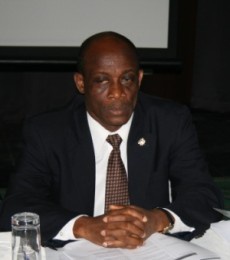Pressure for higher wage rises, especially in the public sector, is set to climb following the substantial increases in water and electricity prices last week, which added to a 20 percent jump in transport prices last month.
The impact of the growth in household energy costs is likely to raise wage demands as government and the Trades Union Congress (TUC) prepare to hold 2014 wage talks before November’s budget reading, Sampson Akligoh, economist and head of research at Databank, told the B&FT.
On Wednesday, the Public Utilities Regulatory Commission (PURC) announced that electricity tariffs will increase as much as 78.9 percent, while the rates for water will rise by 52 percent from October. The increases, it is feared, could lead to a sharp rise in salary demands, with government -- which accounts for around one-third of all formal sector jobs -- already battling what Finance Minister Seth Terkper has described as the “unsustainable” path of public sector wage growth.
“It seems unavoidable as recent fiscal figures show that public sector emoluments and interest payment basically absorbed much of tax revenue for the period,” said Akligoh. “For domestic consumers, the pressure will again be pushed on employers to compensate for welfare losses.”
Wages and other compensation for government employees are the largest sector of state spending, equivalent to 72 percent of tax revenue in 2012. Government has been at pains to reverse this situation that crowds out much-needed spending on social investments and infrastructure.
Ghana’s severe fiscal slippage in 2012 - when the budget gap of 11.8 percent of GDP was almost twice the projected level -- was due largely to extra unbudgeted spending on wages, Mr. Terkper said in March.
In April and June, the IMF urged government to “gain control over the wage bill” and conduct a thorough audit of the public sector pay-roll. Estimates are that there are about half-a-million workers on the pay-roll, but this number is believed to include a lot of fictitious or “ghost” workers.
This year government capped public sector wage increases at 10 percent, the lowest rise since 2010, as part of moves to contain the growth of the wage bill. It however raised the national minimum wage by 17 percent to GH¢5.24 (US$2.62). Both increases compare to an average inflation rate of 11 percent in the first eight months of the year.
Kofi Asamoah, Secretary-General of the TUC, said in an interview on September 6 that wage negotiations for 2014 will be based on the projected inflation for next year and the general cost of living.
Mr. Terkper has said government’s target is to cut the cost of the wage bill to 35 percent of tax revenue -- which is consistent with the ceiling set by the West African Monetary Zone (WAMZ), the group of six regional economies, including Ghana, which plan to have a common currency by 2015.
Mr. Akligoh said the hikes in utility and fuel prices will also stoke inflationary pressure and affect the broader macro-economy. “I think we must begin to worry about unplanned macroeconomic disruptions and welcome a more guided approach,” he said.
He also worried about the effect on economic growth, which is expected to fall from 7.9 percent in 2012 to 7.4 percent this year.
“I am concerned that this will certainly worsen the woes of industry and drag growth marginally downwards after the earlier fuel and transport price increases.”
Business News of Tuesday, 1 October 2013
Source: B&FT
Pay pressure set to mount













